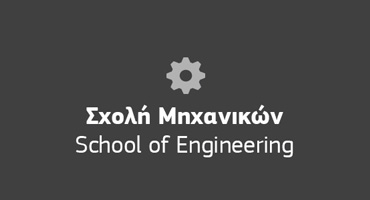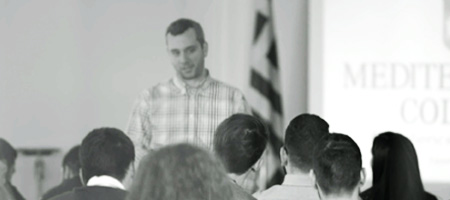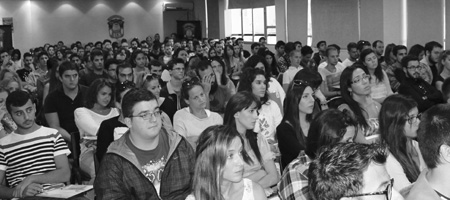





MEng / BEng (Hons) Mechanical Engineering & Design
-
The 1st to be offered in Greek private higher education.
-
No1 in Greece | TOP20 in the UK.
-
Leads to an integrated Master’s degree.
-
Worldwide professional recognition.

Course Information
The School of Engineering at Mediterranean College was established in 2005 and was the first to ever offer a Mechanical Engineering degree in Greek private higher education. The MEng/ BEng (Hons) Mechanical Engineering & Design is validated by the University of Derby, a TOP20 UK University in Mechanical Engineering, according to the Guardian University Guide, 2019. Derby is a city of technology, with world-famous companies including Rolls-Royce, Bombardier and Toyota right on the University’s doorstep.
This is a five-year undergraduate programme with integrated Master’s, which can lead to a charted engineer status, according to the requirements of the UK Institution of Mechanical Engineers, and to full professional recognition in Greece.
What you will study
Our aim is to provide you with a solid academic background in Mechanical Engineering and also equip you with practical skills in mechanical engineering design, modelling and management. We have adjusted the programme’s content, to ensure that you are taught what you’ll be asked to apply as a professional in Greece and abroad.
Our course is designed to cover the three, key mechanical engineering study fields: Energy, Construction, and Industrial Management. You learn how to design and model, using contemporary software tools, such as AutoCAD, SolidWorks, Abacus/ Ansys, MATLAB. Also, your focus on management enables you to develop entrepreneurial activity and pursue higher managerial positions in the technical sector.
You have access to high-end labs and facilities, strengthening your practical skills: Metrology, CAD Design & Prototyping, Metal Processing, Technology & Strength of Materials, Fluid Engineering. Our specialised academic staff and collaborating business partners keep you up to date with the latest industry developments and scientific research.
Why choose this course
- The degree is awarded by the TOP ranked UK University in Greece and TOP20 in Britain.
- It is the 1st Mechanical Engineering programme to be offered in Greek private higher education.
- It is a five-year undergraduate, integrated Master's degree, which can lead to full professional rights in Greece, the UK and internationally.
- You may exit the course in 4 years, with a BEng (Hons) Mechanical Engineering & Design and achieve an Incorporated Engineer professional status.
- The programme equally focuses on Energy, Construction and Industrial Management.
- You practice the most renowned software: AutoCAD, SolidWorks, Abacus/ Ansys, MATLAB.
- You have access to both internal and high-quality external lab facilities.
- You broaden your horizons through industrial visits and field trips, guest lectures by leading professionals and real-life projects.
- You become a bilingual mechanical engineer, with excellent academic & professional prospects.
You will learn through lectures – including guest lectures, practical demonstrations and labs, tutorials, industry visits, field trips and extensive e-learning material. Assessment is designed to include individual and team coursework, case studies, prototype design, professional presentations, and written exams. Through dissertation, you will undertake to tackle realistic industry problems, that will give you an insight of real workplaces.
Courses
Year 1
Mathematics for Study in Technology
The aim of this module is to provide the fundamental mathematical knowledge and techniques needed to successfully progress to undergraduate study in technology. The module introduces you to, or refreshes your knowledge of, mathematical terms, basic algebra, calculus and geometry and trigonometry.
Scholarship for Technologies
A crucial stage in the development of the student is in the assumption of responsibility for learning. The student must be self-motivated, organised and independent. The development of critical thinking and meticulousness is fundamental to university study. This module will provide you with a variety of scholarly and communication competencies necessary for a successful career in the engineering and technology fields.
English for Study in Technology Part A
English for Study in Technology A aims to increase students’ general English ability and introduce some features of academic language use with particular focus on the study of technology. By the end of the module students should have reached IELTS 5.0 equivalent level.
Engineering Science
This module deals with basic engineering science concepts, together with analytical and practical applications in mechanical and civil engineering science. It enables students to use fundamental mathematical techniques for the evaluation, analysis, modelling and solution of realistic engineering problems. It also aims to develop an understanding of basic electrical and electronic theory and principles.
Introduction to Structural Analysis and Dynamics
This module provides the fundamental concepts, together with elementary analytical and practical applications in engineering disciplines in order to reinforce students’ knowledge in scientific principles and thereby prepare students for future engineering studies. It also provides a framework for developing a good knowledge of the important theories, principles, procedures and codes that form the basis of structural analysis and design.
English for Study in Technology Part B
English for Study in Technology B aims to further students’ general English ability and knowledge of features of academic language use with particular focus on the study of technology. By the end of the module students should have reached IELTS 5.5 equivalent level.
Year 2
Applied Scientific Methods
It deals with basic concepts, together with analytical and practical applications in mechanical engineering science, providing a broad foundation of knowledge required by students in engineering and therefore preparing them for further studies in specific fields including analytical methods and Mathematics, needed for the more advanced optional units. This module also enables students to use fundamental mathematical techniques for the evaluation, analysis, modelling and solution of realistic engineering problems.
Management of the Business Environment
This module challenges the student to produce professional communications based on research into a range of engineering processes and procedures that are necessary to operate in a competitive global market. Students’ skills are developed using a range of current computer based software packages and tools in order to produce outstanding output for professional development planning and continuing professional development.
Computer Aided Design
This module concentrates on CAD using software for the production of two dimensional models of engineering components and assemblies. Industry standard layer convention and libraries of standard symbols along with system procedures and functions are used to speed up the drawing process. The three dimensional model is utilised to produce elevations, perspective various views and 3D models. Text insertion and automatic dimensioning to a drawing are investigated.
English for Study in Technology C
English for Study in Technology C aims to further students’ general English ability and knowledge of features of academic language use with particular focus on the study of technology. By the end of the module students should have reached IELTS 6.0 equivalent level.
Engineering Design and Workshop Technology
The aim of this module is to give students an opportunity to experience the process of carrying out a design and build project. It will enable them to appreciate that design involves synthesising parameters which will affect the design solution. The module will introduce them to the workshop and a number of manufacturing process including turning, milling and sheet metal forming.
Materials and Manufacturing Processes
An awareness of the wide range of materials and manufacturing methods is essential if the designer is to optimise the product for a competitive market with due regard to environmental considerations in terms of energy and resources. The module will emphasise the requirement for interactive consideration of materials, manufacturing method and design in an examination of established and innovative methods of producing to meeting market demands.
Regulatory Systems
This module develops an awareness of the principles of regulatory systems including health and safety planning and implementation at the work place. It covers the UK, EU health and safety legislation and Greek regulations proposed by Hellenic Institute for Occupational Health and Safety including risk assessment and evaluation processes when applied to any potential hazard at work.
Year 3
Advanced Applied Analytical Methods
This module aims to develop the understanding of, and the ability to apply, a broad spectrum of advanced mathematical techniques in a range of typical engineering situations. Basic mathematical concepts (such as algebra, calculus and trigonometry) will be extended further.
Engineering Design Modeling
This module, after ensuring that you are comfortable with the utilisation of modern engineering workstations, aims to cover the essential elements of parametric modelling and further concentrates on the parametric aspects from 2-dimensional parametric profiling to 3-dimensional parametric modelling including profile sweeping and primitive manipulation.
Structural Analysis and Materials
This module develops basic stress concepts following those covered in the stress section of the Applied Scientific Methods based modules into more complex real-life loading situations. Many actual engineering situations are complex and basic structural calculations can only give approximate answers. Engineers also need to optimise materials selection for different designs and sections. This can be assisted through the use of Performance Materials Design Indices.
Corporate Responsibility and Professional Development
The module investigates the role of the engineer in industry and society and to plan out their own career progression as part of a Personal Development Plan (PDP). This could be linked with professional bodies (e.g. IMechE or their equivalent) and the learner should develop an understanding of the varying routes to professional accreditation with a recognised body.
Thermofluids
The aim of this module is to extend your knowledge of the principles of fluid mechanics and the techniques used to predict the behaviour of fluids in engineering applications. The unit looks at the forces exerted by a static fluid on immersed surfaces, viscosity; the flow of fluids through pipelines and around bluff bodies, it examines hydraulic machines, understanding the enthalpy and entropy.
Vibration and Dynamics
The module deals with mechanical systems in motion and present a range of engineering problems associated with movement. Individual components may have undesirable dynamic characteristics - i.e. vibration. Mechanisms - systems of components can have complex motion and the control of these systems by means of feedback can lead to instability.
Year 4
Advanced Engineering Design Modeling
This module aims to impart a significant understanding of parametric principles and will update the student's skills to the application of such techniques in a 3-Dimensional Parametric Solid Modelling/Conceptual Design environment using enhanced modelling techniques. It is essential that such a designer be able to parametrically specify and functionally examine models constructed from initial concept.
Advanced Powertrain Engineering or Industrial Engineering
The aim of this module is to give students an in-depth technical information concerning the design, operating principles and modifications possible to the modern high-performance power unit and its associated systems and to the modern types of transmission system used in Motorsport, and for them to critically evaluate the systems, apply techniques and analyse the processes concerned.
Industrial Engineering
This module provides an introduction to the Industrial Engineering (IE) tools and techniques as well as Engineering Ethics basic concepts and methods. Students will gain an appreciation of the ways in which these branches of Engineering support the business objectives, usually in the form of standards data, productivity improvements and ideal ethical behaviors.
Advanced Mechanical Design and Materials
Within the module takes place an integrated engineering approach which incorporates the infrastructure and design and analysis formats and tools that can be exercised in a concurrent nature and provides benefits from a standpoint of producing a better design, faster results, lower cost uncertainties and reduced risk. The module provides one of the key enabling capabilities needed in performing detailed engineering design and analysis throughout a product's development cycle.
Applied Thermodynamics
This modules aims to enable students to develop further skills and knowledge for the analysing, designing and evaluating engineering thermodynamics applications.
Independent Study and Professional Development (Mechanical Engineering)
This module requires you to produce a coherent, sustained and comprehensive research based study, demonstrating an ability to generate complex proposals with awareness of current issues in Mechanical Engineering. You will be challenged to demonstrate a critical understanding of how the boundaries of knowledge are advanced through research in production of clear, logically argued and original work related to the field of study.
Year 5
Research Methods, Application and Evaluation
This module will enable you to develop your practice in undertaking research by identifying and applying advanced research methodologies; both within your taught modules and for your Interdisciplinary Team Project. Your learning will include how to identify, evaluate, and apply diverse research approaches to research, the process of collecting and evaluating different types of data and how to relate findings to current research and development projects within a team. During your study you will be able to compare the use of both quantitative techniques and qualitative techniques in engineering research.
Environmental Risk and Responsibility
The module enables engineers to critically evaluate how their individual professional actions, decisions and leadership of others interacts with the society in which they are working and affects environmental risk and the sustainable future of the planet. This is an interdisciplinary module so that students will be asked to work outside their areas of expertise and interact with other students and members of the community from different cultural, social and disciplinary areas to evaluate and offer design and technological decisions to reduce environmental risks.
Forensic Engineering, Failure Analysis and Prevention
Forensic engineering is the study of product, process or design failures and how these link to international legislation and standards or, in some cases, to legal investigations. The module reviews the identification and advanced analysis of a range of failure modes for engineered products. Mechanical analysis for the assessment and deduction of factors which contribute to the onset of failure such as loading types, materials, and manufacturing techniques, environmental and structural properties are reviewed to predict failure scenarios in mechanical applications.
Advanced Mechanical Design and Manufacturing Engineering (optional)
An integrated design, material and manufacturing approach provides one of the key enabling capabilities needed in effectively performing detail engineering design and analysis throughout a project's development cycle. This integrated engineering approach incorporates the infrastructure and design and analysis formats and tools that can be exercised in a concurrent nature and provides benefits from a standpoint of producing a better design, with lower cost uncertainties and reduced risk.
Energy Management and Conservation (optional)
The aim of the module is to provide integrated knowledge regarding energy management practice including the technical principles, methods and technologies that enable energy efficiency improvement, energy auditing methods, energy information management methods, financial analysis of energy management opportunities and energy procurement. are some of the key areas that help in effective energy management. In addition, renewable energy sources and their contribution to the energy conservation will be examined too.
CPD and Strategic Management
This module is designed to develop students’ managerial skills in preparation for work in a global industry environment. Students will study strategic concepts and will be able to transfer them into their own industry/specialism through a structured approach. Emphasis is placed on managing the global future by analysis rather than by instinct. Students will become adept at forecasting, financial analysis but still operate with regard to business ethics.
MEng Interdisciplinary Group Project
The Interdisciplinary Group Project (IGP) is a key feature in the MEng Mechanical Engineering and Design programme. In this module, you will work in teams on complex projects, which will be broad in scope and closely associated with an industry problem or a current research area of the College or industry. Each project will be supervised by a member of academic staff, but there will also be regular interaction with industrialists or researchers involved in the area.
Admission Requirements
This course is right for you, if you are a high school graduate of any discipline with the necessary English language skills, who aspires to build a career as a Mechanical Engineer.
The minimum English language requirement for the bilingual course (Greek and English) is equivalent to IELTS 4.5 (B1) and for the English-taught course is equivalent to IELTS 6.0 (B2). If you do not possess an official English language certificate, you can sit the College’s internal placement test.
Moreover, you’ll be asked to submit a reference letter from a tutor, and you’ll be called for an academic interview with the programme leader.
If you are a general high school graduate from a technology study route and high marks or an IEK diploma holder in Mechanics, you are eligible to apply for direct entry to the 2nd year of study. If you are an HND graduate or a University student or graduate in a relevant discipline, you may be granted advanced entry, through recognition of prior learning.
Application & Enrolment
We use a rolling admissions policy, so we accept applications throughout the calendar year until all available places are filled. Since this is a lab-based course with a cap in available places, we urge you to submit your application in time.
We also offer multiple fee payment methods, individual payment plans and bursaries based on academic, athletic and socio-economic criteria.
Contact us today and find out more about this course and the available bursaries and funding opportunities. Our admissions advisors will provide you with all necessary information and will guide you through the application and enrolment process.
Degree recognition
As a holder of a recognised MEng degree, you may individually apply for membership with the UK Institution of Mechanical Engineers. This five-year MEng course allows you to pursue a Chartered Engineer (CEng) status, so that you can also claim full professional recognition in Greece. The four-year BEng programme leads to an Incorporated Engineer professional status. In any case, should you wish to obtain a license to practice in Greece, you are required to apply for professional recognition with ATEEN (Hellenic Ministry of Education), which grants you the right to then register with the Technical Chamber of Greece.
Here you can view professional recognition ministerial decisions for some of our BSc (3 or 4-year course) Engineering graduates.
Click here for more information on the degree recognition procedure by Greek authorities.
Postgraduate study
After successfully completing the programme, you may continue for a Master’s degree at Mediterranean College or at overseas universities. At Mediterranean College you can choose among:
If you wish to combine Engineering with Management and pursue higher managerial positions in the Engineering or other industries, you may like one of the following postgraduate courses:
Career
Mechanical Engineering university graduates have a wide span of professional activity. You may work as a freelancer Mechanical Engineer or as an associate or employee at:
- Industries
- Technical/ construction firms
- Engineering planning/ consulting agencies
- Renewable Energy companies
- Car/ yacht dealerships
- Mechanical equipment trading companies
- Repair companies
- Maritime companies
- Workshops and research laboratories
- Consultancies
Testimonials
My experience at the College taught me many things that will help me in my professional career. Among those things are consistency and an ethical approach to the work place. I would like to take this opportunity to thank all my tutors for the excellent work they performed, which has made my studies painless, leaving a very pleasant experience and a feeling that my efforts were worthwhile....
Diogenis Vakontios, BSc (Hons) Mechanical Engineering
An exciting period of my life came to an end. It was three unforgettable years through which I gained the necessary knowledge on the subject of Mechanical Engineering. Among the various events, visits and workshops that I attended with my classmates, in a climate of cooperation and a common purpose, I completed my studies at Mediterranean College. There was a genuine cooperation between the College staff and students, who...
Aggelos Fois, BSc (Hons) Mechanical Engineering
I'd never go anywhere else, because I would be bored, there's so much things to do as a mature student, the college is amazing, the people are great and you never get bored!...
Andreas Lazarides, BSc (Hons) in Civil Engineering




